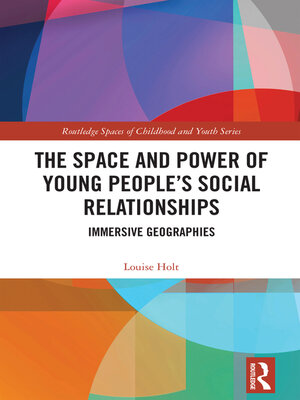The Space and Power of Young People's Social Relationships
ebook ∣ Immersive Geographies · Routledge Spaces of Childhood and Youth Series
By Louise Holt

Sign up to save your library
With an OverDrive account, you can save your favorite libraries for at-a-glance information about availability. Find out more about OverDrive accounts.
Find this title in Libby, the library reading app by OverDrive.



Search for a digital library with this title
Title found at these libraries:
| Library Name | Distance |
|---|---|
| Loading... |
The book examines the power of young people's social relationships in schools to transform, or more often, to continue, differences that pervade societies: mind-body-emotional diff erences or Special Educational Needs and Disability, gender, poverty, race/ethnicity, sexuality and their intersections. The book details extensive qualitative research with young people, foregrounding their accounts.
In challenging educators and others to engage with young people's own agencies and to make space for their socialities, the concepts of embodied social and emotional capital and young people as contextual bodies/subjectivities/agencies are developed, emphasising both young people's agencies and how these are socio-spatially situated, constrained and enabled. The book is most concerned with how and when young people challenge and change enduring differences. The concept of 'immersive geographies' outlines the potential of change inherent in the repeated coming together of the same people in space, doing similar things that are, however, always provisional and always with the potential to be done diff erently. Examples of when diff erence is transformed are presented.
The book marks a major interdisciplinary contribution to geographies and social studies of children, youth and education, child development, social work, social policy and education studies. Furthermore, it is of appeal to anyone interested in young people, social reproduction and sociality: from educators, policy makers, youth workers and social workers to parents.







